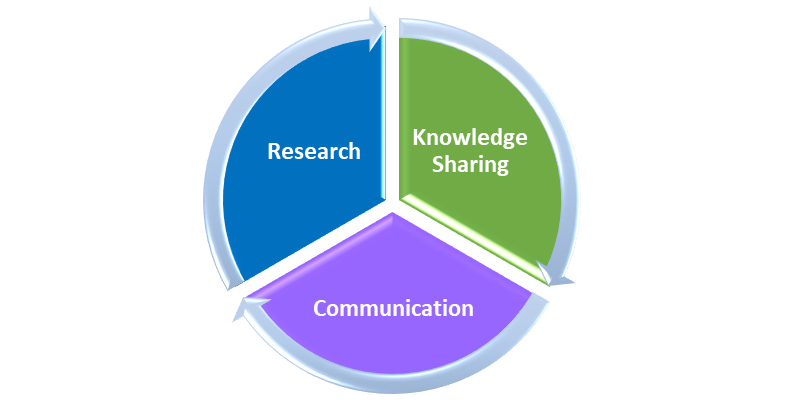Strategic Plan 2021 – 2023
The purpose of the Consortium is to facilitate the implementation of policies and practices that support student mobility both within and among Provinces and Territories and granting of transfer credit in order to improve access to post-secondary education in Canada. Over the past few years, the PCCAT board and members have developed a strategic plan that will guide the growth of the Consortium over the next three years. With a focus on delivering value to its members, PCCAT will pursue activities in the areas of Research, Knowledge Sharing and Communication:


PCCAT will work collaboratively to engage in research to inform planning, monitor trends, and advance effective student mobility and transfer practices across Canada.
PCCAT will collate and make available research conducted through others, promote opportunities to contribute to research projects, and highlight unique approaches through the following actions:
- Collate, thematically group, and facilitate access to related credit transfer and student mobility research conducted through CATS/others across Canada
- Identify, analyze & synthesize trends in credit transfer practice and student mobility
- Identify, communicate and contribute to inter- and intra-provincial research projects and partnerships
- Conduct/lead original research

PCCAT will work collaboratively to enable members to develop and share tools and effective practices that support institutional /jurisdictional capacity to enhance student mobility.
PCCAT will use various technologies and social media to enable the sharing of information and best practices. Enhance the PCCAT website with features open to any visitor:
- Description of transfer, why it is important, and what it means to learners and institutions
- Roadmap of post-secondary ecosystem, mandates and roles of PSIs in each jurisdiction/province
- Quality assurance processes and authorities in each jurisdiction/province
- High-level profiles of selected articulation agreements and learner pathways with a focus on inter-provincial agreements
- Lists/databases of transfer agreements across Canada
- Equivalency search tools across the country (and beyond)
- Links to credential assessment tools & services in Canada
- Member profiles & logos
- Comprehensive glossary
Enhance the PCCAT website with features accessible only by members:
- Directory of individual members and identification of “experts” – searchable by topic
- Interactive knowledge sharing through discussion boards/list-servs; webinars (live and on-demand) and pre-conference workshops showcasing effective practices
- Toolbox for pathway development that can be used by members as they look to expand learner pathways: credit transfer agreement template(s) and resources, a maintained and enhanced nomenclature/ transfer guide, and resources for articulation committee development & management
- Tools, information and supports for members: document/presentation repository – searchable by topic, detailed profiles of selected articulation agreements and learner pathways with a focus on inter-provincial agreements, grade conversion tool/grade scales, international transfer practices, equivalency assessment guide, mentorship program, and data sharing

PCCAT will work collaboratively to: Ensure stakeholders have access to transfer and student mobility related information.
PCCAT will establish a structured approach to communicating with its stakeholders to ensure access to information where and when it is needed.
The Communications and Marketing Committee will build a strategic communications plan for PCCAT that will include the following activities:
- Establish a program to grow reciprocal linking – PCCAT to other orgs/other orgs to PCCAT
- Opinion/ commentary/ letters
- Presentations/ publishing research
- Host annual conference• Host annual conference
- Engage with members through enhanced website and social media
- Provide links to key information needed by each stakeholder group (government, PSE institutions, current and prospective students, affiliated groups/organizations)
- Connect with CATCan Network
